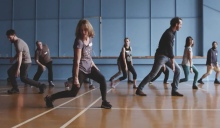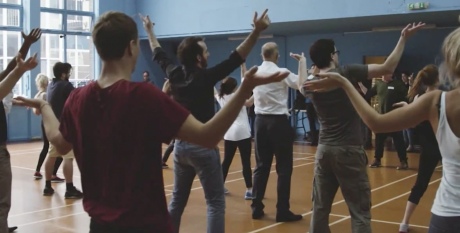West end choreographer gets Imperial team dancing
An Imperial research team has been dancing up a storm under the direction of a West End choreographer they helped to get back on his feet.
As one of the UK’s leading stage and film choreographers, Anthony van Laast’s life revolves around his ability to push his body to its movement limits.
Dancers are, by many metrics, pretty close to physical perfection
– Professor Justin Cobb
However the intense nature of life as a professional dancer had left its mark, and last year Anthony found himself unable to move with severe hip problems.
“If I wasn’t able to dance again I have no idea what I would do,” he says, contemplating a future that lay before him just a few months ago.
Looking for treatment that would allow a full return to his profession, Anthony turned to Imperial’s Professor Justin Cobb, chair of orthopaedic surgery and director of the MSk research lab at Charing Cross Hospital.

Anthony van Laast
For Professor Cobb and the MSk team, Anthony’s condition was not unexpected. “People who wear their joints out early in life often aren’t normal people; they’re people who are often more physically defined than normal,” says Professor Cobb. “Dancers are, by many metrics, pretty close to physical perfection. Quite often people who were professional dancers, or professional athletes, wear their joints out 30 or 40 years earlier than other people in their class at school who weren’t so athletic.”
Alongside clinical orthopaedic work, the MSk Lab, with its diverse team of scientists, surgeons, engineers and physiotherapists, is conducting research to better understand musculoskeletal health and developing new tools for orthopaedic surgery and rehabilitation. One avenue of research is a cross-departmental project with engineers at the South Kensington campus using technology, both to map people’s quality of life from a physical point of view, and find better ways to restore it.
The idea of helping a patient achieve the best quality of life possible after surgery is an important driver for the MSk team. “If the patient can’t do what they love doing, it can have a huge cost, particularly when its their job,” says Professor Cobb. “Our motive is to help people keep doing what they love, and do it better!”
 Following an operation under Professor Cobb, Anthony has now made a full recovery and is back working full-time “For me as a choreographer this is my livelihood, it’s my life, so this operation was incredibly important” says Anthony. “Justin was a complete lifesaver for me, it was like a miracle”.
Following an operation under Professor Cobb, Anthony has now made a full recovery and is back working full-time “For me as a choreographer this is my livelihood, it’s my life, so this operation was incredibly important” says Anthony. “Justin was a complete lifesaver for me, it was like a miracle”.
Anthony also recently led a dance session at Charing Cross as a thank-you to the team that helped him. Not only was it a unique gesture, but a great opportunity for a large team to discover some unexpected qualities in each other. “It turns out that there are several people down the corridor who are keen dancers, and there are several who are not keen at all!” says Professor Cobb. “We all had a great time though, it was just completely wonderful.”

Article text (excluding photos or graphics) © Imperial College London.
Photos and graphics subject to third party copyright used with permission or © Imperial College London.
Reporter
Martin Sayers
Communications Division